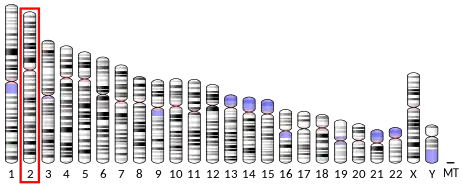KCNH7
Potassium voltage-gated channel subfamily H member 7 is a protein that in humans is encoded by the KCNH7 gene.[5] The protein encoded by this gene is a voltage-gated potassium channel subunit.[5]
| KCNH7 | |||||||||||||||||||||||||||||||||||||||||||||||||||
|---|---|---|---|---|---|---|---|---|---|---|---|---|---|---|---|---|---|---|---|---|---|---|---|---|---|---|---|---|---|---|---|---|---|---|---|---|---|---|---|---|---|---|---|---|---|---|---|---|---|---|---|
| Identifiers | |||||||||||||||||||||||||||||||||||||||||||||||||||
| Aliases | KCNH7, ERG3, HERG3, Kv11.3, potassium voltage-gated channel subfamily H member 7 | ||||||||||||||||||||||||||||||||||||||||||||||||||
| External IDs | OMIM: 608169 MGI: 2159566 HomoloGene: 13249 GeneCards: KCNH7 | ||||||||||||||||||||||||||||||||||||||||||||||||||
| |||||||||||||||||||||||||||||||||||||||||||||||||||
| |||||||||||||||||||||||||||||||||||||||||||||||||||
| |||||||||||||||||||||||||||||||||||||||||||||||||||
| |||||||||||||||||||||||||||||||||||||||||||||||||||
| |||||||||||||||||||||||||||||||||||||||||||||||||||
| Wikidata | |||||||||||||||||||||||||||||||||||||||||||||||||||
| |||||||||||||||||||||||||||||||||||||||||||||||||||
References
- GRCh38: Ensembl release 89: ENSG00000184611 - Ensembl, May 2017
- GRCm38: Ensembl release 89: ENSMUSG00000059742 - Ensembl, May 2017
- "Human PubMed Reference:". National Center for Biotechnology Information, U.S. National Library of Medicine.
- "Mouse PubMed Reference:". National Center for Biotechnology Information, U.S. National Library of Medicine.
- Gutman GA, Chandy KG, Grissmer S, Lazdunski M, McKinnon D, Pardo LA, Robertson GA, Rudy B, Sanguinetti MC, Stuhmer W, Wang X (Dec 2005). "International Union of Pharmacology. LIII. Nomenclature and molecular relationships of voltage-gated potassium channels". Pharmacol Rev. 57 (4): 473–508. doi:10.1124/pr.57.4.10. PMID 16382104. S2CID 219195192.
Further reading
- Akhavan A, Atanasiu R, Noguchi T, et al. (2005). "Identification of the cyclic-nucleotide-binding domain as a conserved determinant of ion-channel cell-surface localization". J. Cell Sci. 118 (Pt 13): 2803–12. doi:10.1242/jcs.02423. PMID 15961404.
- Ganetzky B, Robertson GA, Wilson GF, et al. (1999). "The eag family of K+ channels in Drosophila and mammals". Ann. N. Y. Acad. Sci. 868 (1): 356–69. Bibcode:1999NYASA.868..356G. doi:10.1111/j.1749-6632.1999.tb11297.x. PMID 10414305. S2CID 33512855.
- Martínez A, Santiago JL, Cénit MC, et al. (2008). "IFIH1-GCA-KCNH7 locus: influence on multiple sclerosis risk". Eur. J. Hum. Genet. 16 (7): 861–4. doi:10.1038/ejhg.2008.16. PMID 18285833.
- Couturier N, Gourraud PA, Cournu-Rebeix I, et al. (2009). "IFIH1-GCA-KCNH7 locus is not associated with genetic susceptibility to multiple sclerosis in French patients". Eur. J. Hum. Genet. 17 (6): 844–7. doi:10.1038/ejhg.2008.259. PMC 2947096. PMID 19156166.
- Bauer CK, Wulfsen I, Schäfer R, et al. (2003). "HERG K(+) currents in human prolactin-secreting adenoma cells". Pflügers Arch. 445 (5): 589–600. doi:10.1007/s00424-002-0980-0. PMID 12634931. S2CID 20178757.
- Strausberg RL, Feingold EA, Grouse LH, et al. (2002). "Generation and initial analysis of more than 15,000 full-length human and mouse cDNA sequences". Proc. Natl. Acad. Sci. U.S.A. 99 (26): 16899–903. Bibcode:2002PNAS...9916899M. doi:10.1073/pnas.242603899. PMC 139241. PMID 12477932.
- Wu C, Ma MH, Brown KR, et al. (2007). "Systematic identification of SH3 domain-mediated human protein-protein interactions by peptide array target screening". Proteomics. 7 (11): 1775–85. doi:10.1002/pmic.200601006. PMID 17474147. S2CID 22474278.
External links
- Kv11.3+Potassium+Channel at the U.S. National Library of Medicine Medical Subject Headings (MeSH)
- KCNH7+protein,+human at the U.S. National Library of Medicine Medical Subject Headings (MeSH)
This article is issued from Wikipedia. The text is licensed under Creative Commons - Attribution - Sharealike. Additional terms may apply for the media files.



